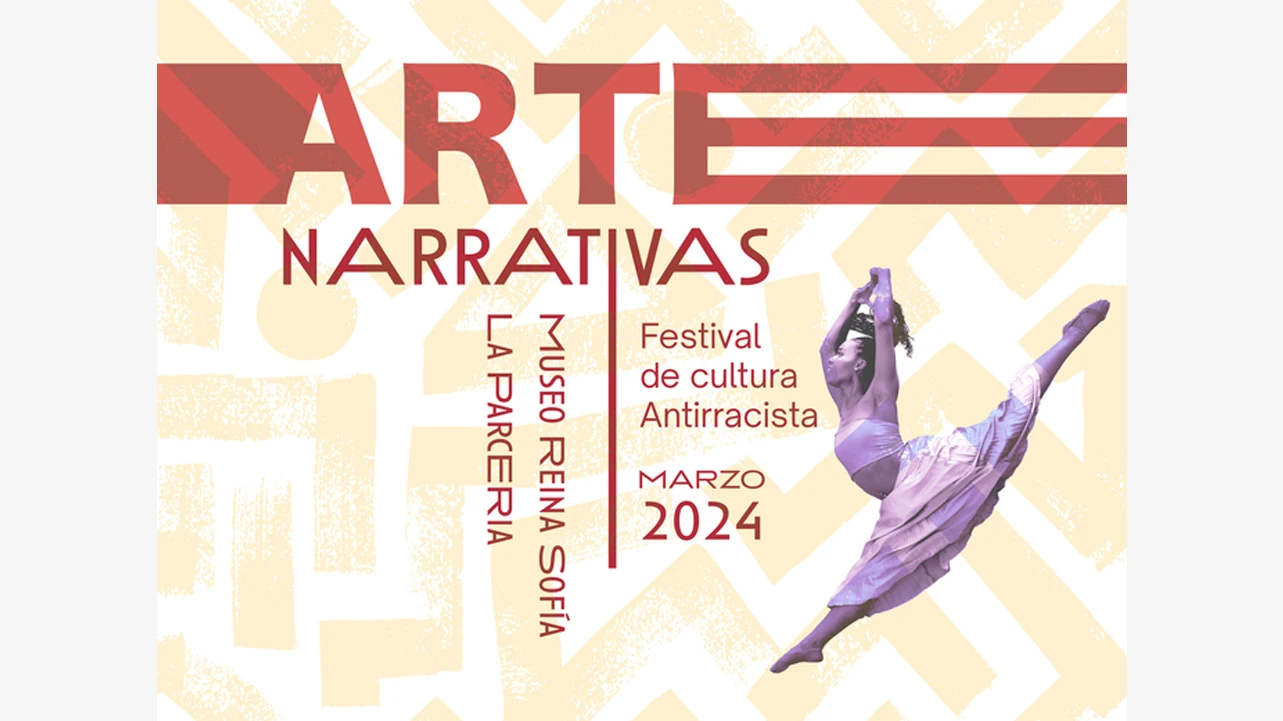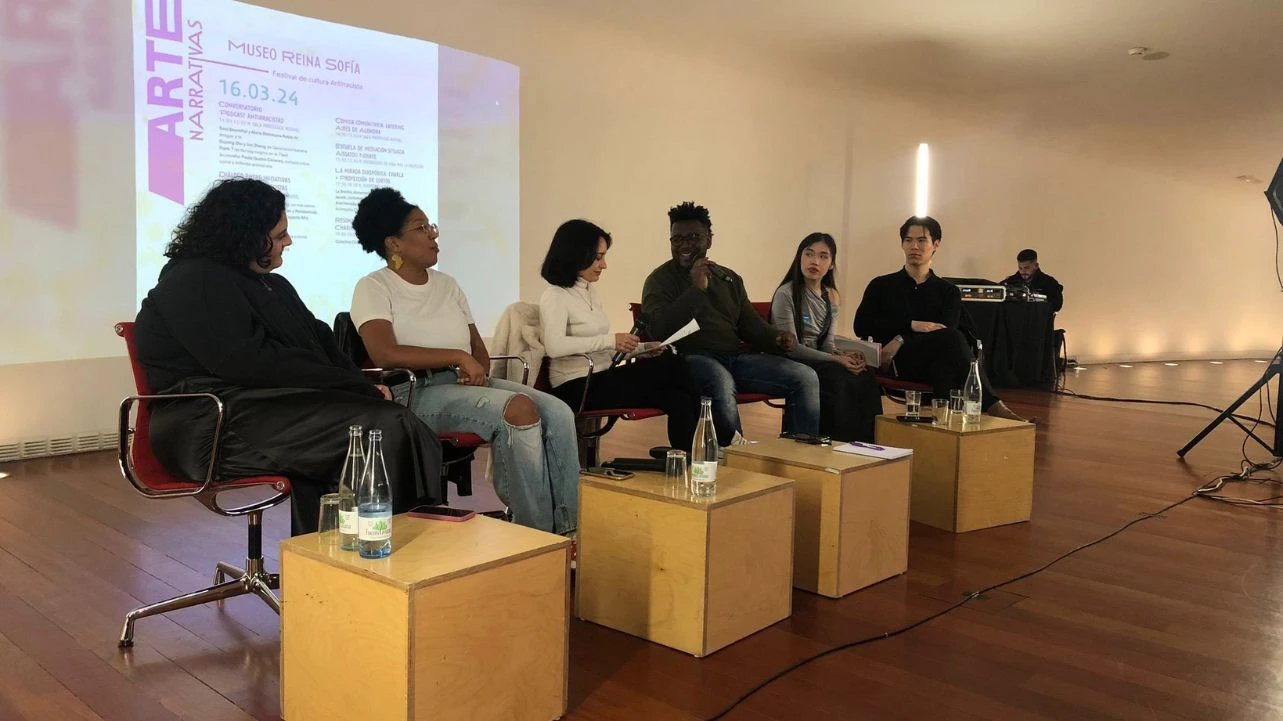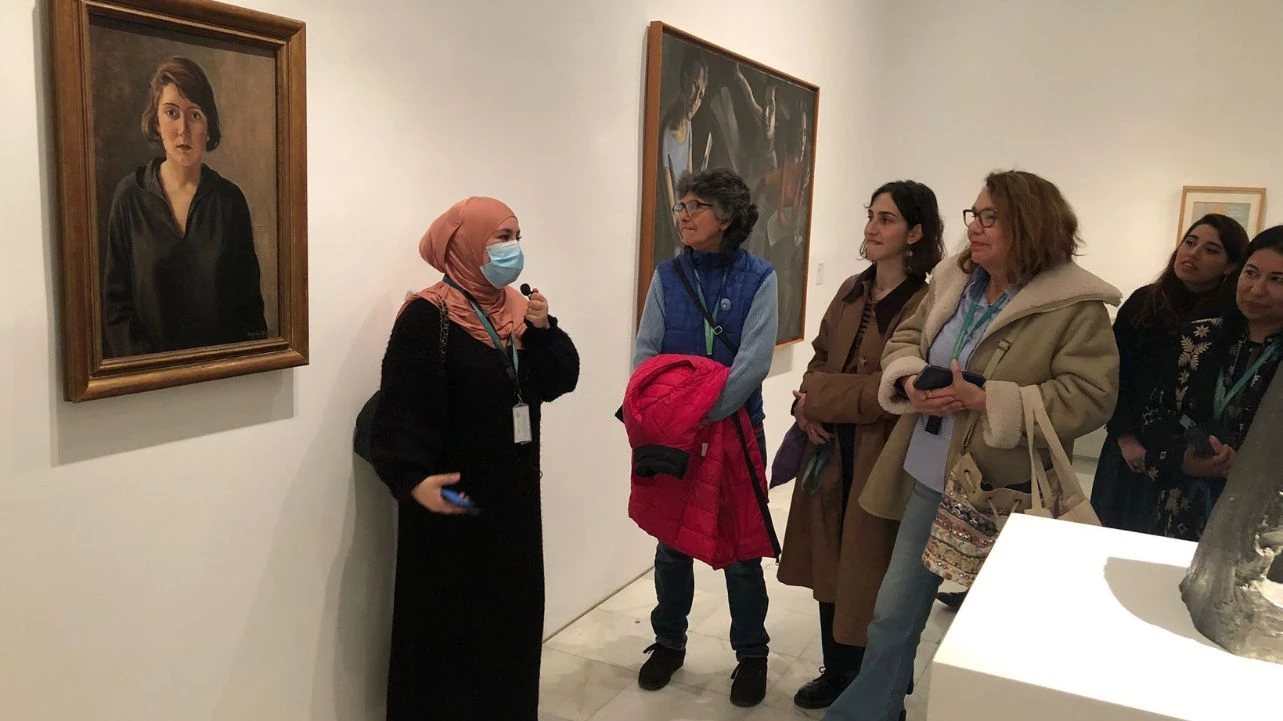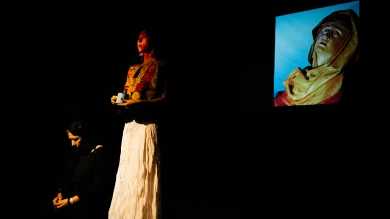-
Friday, 15 March 2024 Nouvel Building, Auditorium 200
Day I
Tickets6pm Introduction
— Conducted by Sarahi Bolekio (SOS Racismo Madrid), Sara Buraya Boned (Museo Reina Sofía, Museo Situado), Julissa Jáuregui (ActionAid Alliance for Solidarity) and Solanyely Sánchez (Festival of Anti-racist Culture)6:30pm Museums and Ethno-racial Diversity
A discussion on the key role of museums in promoting inclusion and equality, as well as the importance of involving ethno-racial communities in creating museographic content.
— With Alejandro Flórez Aguirre, Yeison F. García López, Mercedes Roldán Sánchez and Manuel Segade. Supported by: Andrea Pacheco8pm “Sabia tierra” Respeta la migración (“Wise Earth” Respect Migration)
A dance and theatre piece which addresses the reality facing migrant people and how colonialism has influenced their lives. The work stems from support for the State campaign for the extraordinary regularisation of migrant people in Spain (#RegularisationNow).
— By the Arte sin frontera company -
Saturday, 16 March 2024 Nouvel Building, Protocol Room
Day II
Tickets11am Anti-racist Podcasts
A discussion that examines the role of podcasts in the fight against racism, emphasising awareness-raising strategies and experiences and anti-racist action in this medium.
— With Sara Bourehiyi and Maria Bennouna Rubia (Amigas y té), Ouyang Zhu and Jun Zheng (Generación banana) ad Frank T (No hay negros en el Tíbet). Supported by: Paula Guerra Cáceres12:30pm Dialogue between Anti-racist Cultural Initiatives
A space from which to share and reflect upon the impact and challenges of these initiatives in the fight for equality and social justice.
— With Sandra Carmona (Altramuz Editorial), Amal Hussein (Espacio Afro, Manual Antirracista), Paola Larco Muñoz (Mujeres, voces y resistencia and the Aquí estamos, no nos fuimos, no nos vamos fanzine) and Marcela Rodríguez Mesía (“Sudakasa” project). Supported by: Solanyely Sánchez2pm Community Meal
A collaborative, community-centred culinary experience.
— With Aires de Alondra (Network of Latin American Women) -
Saturday, 16 March 2024
Life Tours around the Collection
Visits to the Collection by mediators from the Aissatou Ndiaye School of Situated Mediation in Darija, Wolof, Bengali and Spanish.
-
Saturday, 16 March 2024 Nouvel Building, Auditorium 400
The Diasporic Gaze
TicketsScreening of the short films La Brecha (2023), by Rob Maldonado, and Ariel Heredia’s Janeth (2023), followed by a conversation to reflect on the experience of diaspora and its representation in contemporary film.
— With Ariel Heredia and Rob Maldonado. Supported by: Claudia Claremi -
Saturday, 16 March 2024 Nouvel Building, Auditorium 400
Resonanciaserpiente
TicketsA performative experience which explores the concept of “the cave” as a symbol of healing and protection, arising in response to reflections on necropolitics. Moreover, it seeks to dissipate borders and physical distances, shifting the “I” to “We are” as a collective echo.
— With Colectivo Chakiñan Mutante

Ariel Antonio Sosa Urquía, poster for the Festival of Anti-racist Culture, 2024
Held on 15, 16 Mar 2024
Since 2019, the Festival of Anti-racist Culture — an initiative between SOS Racismo Madrid and the ActionAid Alliance for Solidarity (a member of the Museo Situado Assembly in this edition) — has sought to give prominence to racialised and migrant artists who, from different artistic disciplines such as theatre, literature, dance and the visual arts, denounce discrimination, assert their resilience and advocate inclusion. This particular edition, in collaboration with the Museo Reina Sofía and La Parcería, is carried out within the framework of the International Day for the Elimination of Racial Discrimination, and is entitled ARTEnarrativas (ARTnarratives) to underline the importance of narratives in the fight against racism and xenophobia.
By way of discussions, screenings, visits to the Museo and stage pieces, the festival substantiates the visual arts, theatre, writing, the podcast and the fanzine as key tools to imagine and build inclusive cultural spaces for the realities racialised people face, and to steadfastly bring about communal enjoyment, reflection and laughter and promote co-existence and social participation.
Organised by
Collaboration
Madrid City Council
Participants
Aires de Alondra is a Peruvian family venture that works to promote and disseminate traditional food, conveying authentic flavours from their places of origin, and the places where they have migrated and travelled. They offer food they like to eat at home using seasonal ingredients and local products, putting forward gastronomy as an instrument of dialogue and care between people.
Amigas y té is a podcast hosted by Sara Bourehiyi and Maria Bennouna Rubia, who aim to talk about their reality as racialised people and the things that happen to them. In their words: “We don’t look to be something general, nor do we seek to be taken as a universal example. We are just one further example. One of the thousands of realities that racialised people in Spain experience”. Behind the production of this podcast is Leilani Tanimoto (video and image technician) and Ricardo Quesada (sound technician).
Arte sin frontera is an internationalist, ecofeminist, anti-species, decolonial and Indigenist collective that came into being in Madrid in 2005. Through art, it defends the rights to Earth and justice. At this festival, they present “Sabia tierra” Respeta la migración (“Wise Earth” Respect Migration), a dance and theatre piece performed by Ada Saliou (dancer, choreographer and dance teacher) and Mayaymara Behoteguy Chávez (an international dancer who began her dance studies in Bolivia).
Sarahi Bolekio is the chairperson of SOS Racismo Madrid. Specialising in anti-racism, gender, migration and social justice, she holds a degree in International Relations from the Rey Juan Carlos University in Madrid and an MA in African Studies and International Relations from the Autonomous University of Madrid. She is currently a field specialist in the Union of Family Associations.
Sara Buraya Boned coordinates the Museo Reina Sofía’s Tentacular Museum Area and is a member of the Museo Situado Assembly.
Sandra Carmona is an illustrator and educator. As a gypsy, mixed-race and lesbian woman, she devotes much of her professional work to illustrating social themes and to denouncing injustice through art. In 2019, she created Altramuz Editorial, a Romani publishing house situated at the heart of creating relevant narratives, whereby all works are written, narrated, illustrated and translated by people who are part of Diversity.
Chakiñan Mutante is a collective, made up of Rob Maldonado, Ana María Serpa and Andrés Vera, which works to shine a light on and challenge injustices affecting the Global South, particularly migrants, dissidents and racialised people, creating a space of healing, transformation and collective construction through action art and profound reflection. Their aim is to unite Abya Yala transdisciplinary creatives to explore and transform society.
Claudia Claremi is an artist and film-maker with a degree in Documentary Film from the International Film School of San Antonio de los Baños in Cuba and in Fine Arts from the University of the Arts, London. Her films have participated in festivals such as the International Film Festival Rotterdam, the Ann Arbor Film Festival, Raindance, the International Film Festival of Guadalajara and the International Short Film Festival Oberhausen. She currently develops different photography and moving image projects, most notably the series Amnesia colonial (2012–2021) and La memoria de las frutas (2015-2023).
Alejandro Flórez Aguirre is the technical coordinator of Proyecto Museo Afro de Colombia, and specialises in management and cultural management, as well as being a social communicator and journalist. He has worked on strategic communication, implementing public policies and project management in Colombia’s culture sector, and has experience in managing processes with all artistic practices, in both public and private entities.
Yeison F. García López is a political scientist, activist and cultural manager who identifies as Afro-Colombian and Afro-Spanish. He earned a degree in Political Science and an MA in Research Methodology in Social Sciences: Innovations and Applications from the Complutense University of Madrid. He is the director of the Espacio Afro cultural centre.
Generación Banana is a podcast on identity, mental health and anti-racism. It came into being on account of the lack of reference points and discussions on the reality of growing up in Spain being Chinese and the internal conflicts that can arise. It is hosted by Ouyang Zhu, an actress, publicist, model, dubbing artist and creative who works in cultural mediation, and Jun Zheng, a sociologist and creative who reflects on the situation of migrant children in Spain.
Paula Guerra Cáceres is a social communicator, anti-racist activist and a member of the team of La Quilombera, a contemporary programme with an anti-racist gaze from the Twitch channel of El Salto. She analyses and investigates structural racism and its consequences, and is also a columnist for online publications such as El Salto, elDiario.es and Pikara Magazine.
Ariel Heredia Pacheco is a Bolivian-born audiovisual artist and most notably the director of the short film Janeth (2023), in which he addresses themes such as migration, family and love. The project was among the ten finalists at the XI Navarra Tierra de Cine Short Film Competition.
Amal Hussein is a programme coordinator with Espacio Afro. With a degree in Political Science and Public Management, she is currently studying an MA in Human Rights, Democracy and Globalisation at the Autonomous University of Barcelona. She also has experience in social and political advocacy, with a focus on human rights, specifically in the defence of international protection and the eradication of female genital mutilation.
Julissa Jáureguiis a political scientist with an MA in International Cooperation. She is a technical specialist in migration and citizen participation for the ActionAid Alliance for Solidarity, where she coordinates projects with associations led by migrant women who work for their recognition as political subjects. She is also a member of the Museo Situado Assembly.
Paola Larco Muñoz is an activist and the co-founder of Mujeres, voces y resistencias (Women, Voices and Resistance), a feminist and anti-racist collective made up exclusively of migrant and racialised women in Valencia. She holds a degree in Economics and is a PhD candidate in Gender Studies and Equality Policies at the University of Valencia.
Rob Maldonado is a transdisciplinary artist who is currently part of the project “Relaciones Sonoras” (Sound Relations) from La Parcería and La Casa Encendida. La Brecha (The Gap, 2023), one of his most recent audiovisual pieces, is part of the artistic research project “Territorio” (Territory), which studies transitions related to displacement.
Andrea Pacheco González is a Chilean researcher and curator who lives in Madrid, and lectures at Nebrija University and is the artistic director of FelipaManuela. She has curated solo exhibitions by artists such as Teresa Margolles, Asunción Molinos Gordo, Los Carpinteros and Juan Castillo, and is co-curator of the exhibition Colonial Memory in the Thyssen-Bornemisza Collections (2024). Moreover, she is the curator of the Chilean Pavilion at the 60th Venice Biennale in 2024 with the Cosmonación project by artist Valeria Montti Colque.
Marcela Rodríguez Mesía is a copywriter, editor and producer. She holds a degree in Media Sciences and Arts, specialising in Performing Art (2006), from the Pontificia Universidad Católica del Perú. She is also the co-founder and editorial and content director of Pequeño Pato Salvaje Editorial (2015), a publishing house which focuses on visual books. She is part of the project “Sudakasa”, an experiential space for community writing and art.
Mercedes Roldán Sánchez is the assistant director-general of Spain’s State Museums. She holds a degree in Law and Art History, specialising in public management applied to museums, and has been a member of the Professional Body of Museum Conservators since 2005.
Solanyely Sánchez is a sociologist, poet, actor and cultural manager, and coordinator of the Festival of Anti-racist Culture.
Susana Sanz coordinates the Museo Reina Sofía’s Tentacular Museum Area.
Manuel Segade is the director of the Museo Reina Sofía. With a degree in Art History from the University of Santiago de Compostela, his curatorial experience spans two decades (2003–2023) and numerous exhibitions in national and international institutions. He was the director of the Centro de Arte Dos de Mayo from 2015 to 2023.
Frank T is an MC and a pioneering producer in Spain’s hip-hop scene. As a communicator, he directs and hosts the La Cuarta Parte programme on Spain’s Radio3 station, and, with Lamine Thior and Asaari Bibang, participates on the podcast No hay negros en el Tíbet from the Podium Podcast network.



Más actividades

Institutional Decentralisation
Thursday, 21 May 2026 – 5:30pm
This series is organised by equipoMotor, a group of teenagers, young people and older people who have participated in the Museo Reina Sofía’s previous community education projects, and is structured around four themed blocks that pivot on the monstrous.
This fourth and final session centres on films that take the museum away from its axis and make it gaze from the edges. Pieces that work with that which is normally left out: peripheral territories, unpolished aesthetics, clumsy gestures full of intent. Instead of possessing an institutional lustre, here they are rough, precarious and strange in appearance, legitimate forms of making and showing culture. The idea is to think about what happens when central authority is displaced, when the ugly and the uncomfortable are not hidden, when they are recognised as part of the commons. Film that does not seek to be to one’s liking, but to open space and allow other ways of seeing and inhabiting the museum to enter stage.
![Tracey Rose, The Black Sun Black Star and Moon [La luna estrella negro y negro sol], 2014.](https://recursos.museoreinasofia.es/styles/small_landscape/public/Obra/AD07091_2.jpg.webp)
On Black Study: Towards a Black Poethics of Contamination
Monday 27, Tuesday 28 and Wednesday 29 of April, 2026 – 16:00 h
The seminar On Black Study: Towards a Black Poethics of Contamination proposes Black Study as a critical and methodological practice that has emerged in and against racial capitalism, colonial modernity and institutional capture. Framed through what the invited researcher and practitioner Ishy Pryce-Parchment terms a Black poethics of contamination, the seminar considers what it might mean to think Blackness (and therefore Black Study) as contagious, diffuse and spreadable matter. To do so, it enacts a constellation of diasporic methodologies and black aesthetic practices that harbor “contamination” -ideas that travel through texts, geographies, bodies and histories- as a method and as a condition.
If Blackness enters Western modernity from the position of the Middle Passage and its afterlives, it also names a condition from which alternative modes of being, knowing and relating are continually forged. From within this errant boundarylessness, Black creative-intellectual practice unfolds as what might be called a history of touches: transmissions, residues and socialities that unsettle the fantasy of pure or self-contained knowledge.
Situated within Black radical aesthetics, Black feminist theory and diasporic poetics, the seminar traces a genealogy of Black Study not as an object of analysis but as methodological propositions that continue to shape contemporary aesthetic and political life. Against mastery as the horizon of study, the group shifts attention from what we know to how we know. It foregrounds creative Black methodological practices—fahima ife’s anindex (via Fred Moten), Katherine McKittrick’s expansive use of the footnote, citation as relational and loving labour, the aesthetics of Black miscellanea, and Christina Sharpe’s practices of annotation—as procedures that disorganise dominant regimes of knowledge. In this sense, Black Study is approached not as a discrete academic field but as a feel for knowing and knowledge: a constellation of insurgent practices—reading, gathering, listening, annotating, refusing, world-making—that operate both within and beyond the university.
The study sessions propose to experiment with form in order to embrace how ‘black people have always used interdisciplinary methodologies to explain, explore, and story the world.’ Through engagements with thinkers and practitioners such as Katherine McKittrick, C.L.R. James, Sylvia Wynter, Christina Sharpe, Fred Moten, Tina Campt, Hilton Als, John Akomfrah, fahima ife and Dionne Brand, we ask: What might it mean to study together, incompletely and without recourse to individuation? How might aesthetic practice function as a poethical intervention in the ongoing work of what Sylvia Wynter calls the practice of doing humanness?

Intergenerationality
Thursday, 9 April 2026 – 5:30pm
This series is organised by equipoMotor, a group of teenagers, young people and older people who have participated in the Museo Reina Sofía’s previous community education projects, and is structured around four themed blocks that pivot on the monstrous.
The third session gazes at film as a place from which to dismantle the idea of one sole history and one sole time. From a decolonial and queer perspective, it explores films which break the straight line of past-present-future, which mix memories, slow progress and leave space for rhythms which customarily make no room for official accounts. Here the images open cracks through which bodies, voices and affects appear, disrupting archive and questioning who narrates, and from where and for whom. The proposal is at once simple and ambitious: use film to imagine other modes of remembering, belonging and projecting futures we have not yet been able to live.

Remedios Zafra
Thursday March 19, 2026 - 19:00 h
The José Luis Brea Chair, dedicated to reflecting on the image and the epistemology of visuality in contemporary culture, opens its program with an inaugural lecture by essayist and thinker Remedios Zafra.
“That the contemporary antifeminist upsurge is constructed as an anti-intellectual drive is no coincidence; the two feed into one another. To advance a reactionary discourse that defends inequality, it is necessary to challenge gender studies and gender-equality policies, but also to devalue the very foundations of knowledge in which these have been most intensely developed over recent decades—while also undermining their institutional support: universities, art and research centers, and academic culture.
Feminism has been deeply linked to the affirmation of the most committed humanist thought. Periods of enlightenment and moments of transition toward more just social forms—sustained by education—have been when feminist demands have emerged most strongly. Awareness and achievements in equality increase when education plays a leading social role; thus, devaluing intellectual work also contributes to harming feminism, and vice versa, insofar as the bond between knowledge and feminism is not only conceptual and historical, but also intimate and political.
Today, antifeminism is used globally as the symbolic adhesive of far-right movements, in parallel with the devaluation of forms of knowledge emerging from the university and from science—mistreated by hoaxes and disinformation on social networks and through the spectacularization of life mediated by screens. These are consequences bound up with the primacy of a scopic value that for some time has been denigrating thought and positioning what is most seen as what is most valuable within the normalized mediation of technology. This inertia coexists with techno-libertarian proclamations that reactivate a patriarchy that uses the resentment of many men as a seductive and cohesive force to preserve and inflame privileges in the new world as techno-scenario.
This lecture will address this epochal context, delving into the synchronicity of these upsurges through an additional parallel between forms of patriarchal domination and techno-labor domination. A parallel in which feminism and intellectual work are both being harmed, while also sending signals that in both lie emancipatory responses to today’s reactionary turns and the neutralization of critique. This consonance would also speak to how the perverse patriarchal basis that turns women into sustainers of their own subordination finds its equivalent in the encouraged self-exploitation of cultural workers; in the legitimation of affective capital and symbolic capital as sufficient forms of payment; in the blurring of boundaries between life and work and in domestic isolation; or in the pressure to please and comply as an extended patriarchal form—today linked to the feigned enthusiasm of precarious workers, but also to technological adulation. In response to possible resistance and intellectual action, patriarchy has associated feminists with a future foretold as unhappy for them, equating “thought and consciousness” with unhappiness—where these have in fact been (and continue to be) levers of autonomy and emancipation.”
— Remedios Zafra

27th Contemporary Art Conservation Conference
Wednesday, 4, and Thursday, 5 March 2026
The 27th Contemporary Art Conservation Conference, organised by the Museo Reina Sofía’s Department of Conservation and Restoration, with the sponsorship of the Mapfre Foundation, is held on 4 and 5 March 2026. This international encounter sets out to share and debate experience and research, open new channels of study and reflect on conservation and the professional practice of restorers.
This edition will be held with in-person and online attendance formats, occurring simultaneously, via twenty-minute interventions followed by a five-minute Q&A.
